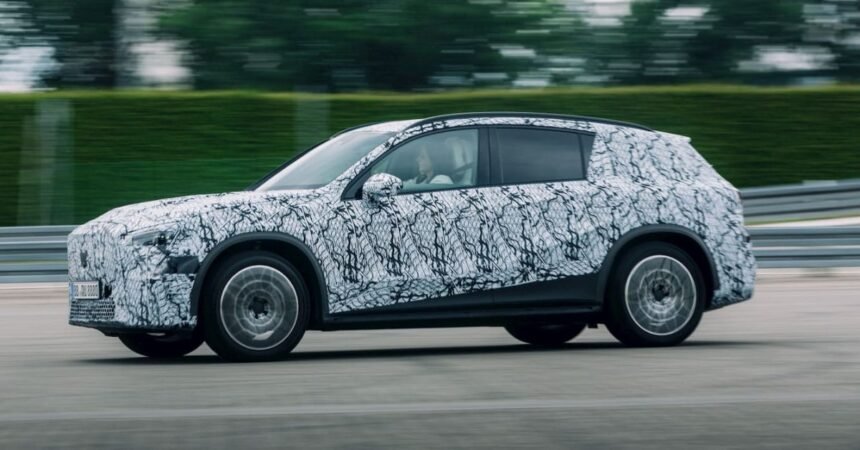Mercedes-Benz is set to unveil the electric version of its popular SUV, the GLC, later this year. With the official debut approaching, Mercedes has shared some new details, giving us an exclusive first look at the new EV.
Although we caught a glimpse of the electric SUV during winter testing in Northern Sweden back in March, Mercedes is now providing a more in-depth look at what we can expect.
“We’re not just introducing a new model – we’re electrifying our top seller,” said Mercedes-Benz Group CEO, Ola Källenius.
The electric GLC promises to “set new standards” with its sleek design, advanced technology, and the new MB.OS operating system.
The new GLC EV offers more space and improved ride quality compared to the current model. With a wheelbase that is 3.1″ longer than the gas-powered version, the electric GLC provides more legroom and headroom for both front and rear passengers.
When all seats are folded, the electric SUV offers 61.4 cubic feet of space, surpassing the gas-powered model’s 56.3 cubic feet of cargo space. Additionally, there is an extra 4.5 cubic feet of space in the front trunk.
Mercedes has equipped the electric GLC with their new 800V electric architecture and latest batteries, allowing the vehicle to regain approximately 161 miles of range in just ten minutes. DC fast charging at over 320 kW is also possible.
The GLC 400 4MATIC with EQ Technology boasts an impressive towing capacity of up to 5,291 lbs, surpassing the Tesla Model Y’s 3,500 lbs towing capacity.
Features like ESP trailer stabilization and trailer maneuvering assistant make towing easier with enhanced stability and control.
Källenius teased the design of the new electric GLC, calling it the beginning of a “new era” and “a new face of the brand as the first in a family of upcoming vehicles.”
The interior of the electric GLC offers a holistic experience, with an optional “majestically floating next-generation MBUX Hyperscreen” powered by the new MB.OS supercomputer.
The new electric GLC will be revealed at the 2025 International Motor Show in Munich on September 7, 2025.
While official range figures will be disclosed at the event, Mercedes anticipates the new GLC to offer a WLTP range of over 400 miles or slightly more than 300 miles on the EPA scale from a 94.5 kWh battery.
Pricing details will be announced later, but considering the current GLC 350e 4MATIC PHEV starts at $59,900 in the US, the electric model is expected to be priced slightly higher, around $65,000.
Overall, the electric GLC represents a significant step forward for Mercedes-Benz, showcasing their commitment to electrification and innovation in the SUV market. The world of technology is constantly evolving, with new advancements being made every day. One of the most exciting areas of development is artificial intelligence (AI), which is revolutionizing the way we interact with technology.
AI refers to the intelligence displayed by machines, which is often compared to the human mind. This technology has the ability to learn, reason, and make decisions, making it incredibly versatile in a wide range of applications.
One of the most common uses of AI is in virtual assistants, such as Siri, Alexa, and Google Assistant. These AI-powered assistants can perform a variety of tasks, from setting reminders and answering questions to controlling smart home devices and playing music. They are able to understand natural language and provide relevant responses, making them incredibly useful tools for everyday life.
AI is also being used in industries such as healthcare, finance, and transportation to improve efficiency and accuracy. In healthcare, AI is being used to analyze medical images, predict patient outcomes, and even assist in surgery. In finance, AI is being used to detect fraud, make investment decisions, and provide personalized financial advice. In transportation, AI is being used to optimize routes, predict traffic patterns, and even drive autonomous vehicles.
The potential of AI is truly limitless, with new applications being discovered all the time. However, there are also concerns about the ethical implications of AI, such as privacy, bias, and job displacement. As AI becomes more advanced, it is important for developers and policymakers to consider these issues and ensure that AI is used responsibly and ethically.
Overall, AI has the potential to revolutionize the way we live and work, making our lives easier, more efficient, and more enjoyable. As this technology continues to develop, it will be exciting to see how AI shapes the future of technology and society as a whole.







